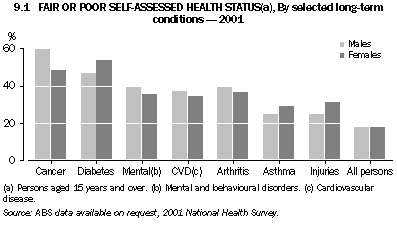The World Health Organization (WHO) defines health as 'a state of complete physical, mental and social wellbeing, and not merely the absence of disease or infirmity'. While the level of disease or infirmity can be assessed by mortality, disability and morbidity statistics, the presence of positive wellbeing is more difficult to measure.
Health and wellbeing
In 2001, the majority of Australians aged 15 years and over considered themselves to be in good health, with 82% reporting their health status as good, very good or excellent. This is similar to the proportion reported in the 1995 NHS (83%). In general, a higher proportion of younger people reported their health to be either excellent, very good or good compared to those in the older age groups.
In 2001, those with long-term conditions lasting or expected to last six months or longer were more likely to report their health as being either fair or poor. A substantial proportion of those with cancer (56%), diabetes (51%), mental and behavioural problems (38%), cardiovascular disease (36%) and arthritis (37%) reported their health to be either fair or poor compared to 18.1% of all those aged 15 years or more assessing their health as fair or poor. (graph 9.1)
